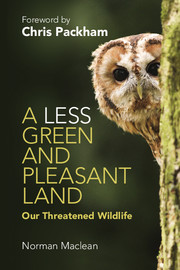Book contents
- Frontmatter
- Dedication
- Contents
- List of wood engraving illustrations
- Foreword
- Acknowledgements
- Introduction
- 1 Living with change
- 2 A short dose of Earth history
- 3 Climate change
- 4 Down on the farm and into the woods
- 5 Plant and animal introductions (and some recent arrivals)
- 6 Our overcrowded isles: human population and aspiration
- 7 Fresh water: quality and availability
- 8 Hunting, shooting and fishing: the enigma of field sports and wildlife
- 9 Wildlife conservation at home and overseas
- So how is our wildlife faring? The details
- 10 Mammals
- 11 Birds
- 12 Amphibians and reptiles
- 13 Freshwater fish
- 14 Butterflies and moths
- 15 Other insects
- 16 Other invertebrates
- 17 Trees, shrubs, herbs and other plants
- 18 Fungi
- 19 Life in the open sea
- 20 Where sea meets land
- 21 Top wildlife sites in Britain and Ireland
- 22 What does the future hold?
- Glossary and abbreviations
- Notes
- Index
- Plate section
10 - Mammals
Published online by Cambridge University Press: 05 April 2015
- Frontmatter
- Dedication
- Contents
- List of wood engraving illustrations
- Foreword
- Acknowledgements
- Introduction
- 1 Living with change
- 2 A short dose of Earth history
- 3 Climate change
- 4 Down on the farm and into the woods
- 5 Plant and animal introductions (and some recent arrivals)
- 6 Our overcrowded isles: human population and aspiration
- 7 Fresh water: quality and availability
- 8 Hunting, shooting and fishing: the enigma of field sports and wildlife
- 9 Wildlife conservation at home and overseas
- So how is our wildlife faring? The details
- 10 Mammals
- 11 Birds
- 12 Amphibians and reptiles
- 13 Freshwater fish
- 14 Butterflies and moths
- 15 Other insects
- 16 Other invertebrates
- 17 Trees, shrubs, herbs and other plants
- 18 Fungi
- 19 Life in the open sea
- 20 Where sea meets land
- 21 Top wildlife sites in Britain and Ireland
- 22 What does the future hold?
- Glossary and abbreviations
- Notes
- Index
- Plate section
Summary
There is no doubt that we feel a very close affinity to mammals, partly because we are most closely related to them, and also because we find their facial expressions and bodily behaviour attractive. Thus we have a national love affair with the horse, and a domestic love affair with cats and dogs. However, wild mammals are much harder to get close to. Supposing a few of us decide to go for a wild mammal trip tomorrow, a sort of British equivalent of an African safari. How would we fare? We might go in the morning to a local wood and tick off grey squirrels, then drive through countryside and see a few rabbits scampering off. Maybe even a roe deer. Then if we were near to a favourable area of coastline, say Blakeney in north Norfolk, we could go out to get a glimpse of common seals, and as darkness falls we might catch sight of a few bats, and identify them by recording their calls and playing them back for ID. So in our action-packed day we might tick off six or seven species. Why not more? The greatest problem is that most mammals are nocturnal, so seeing badgers, otters or hedgehogs is usually a matter of organising a rendezvous in the darkness. Also, many of our mammals are rather secretive, so catching sight of wood mice, field voles, shrews, stoats or polecats is often tricky, and may require some special plan such as catch and release to give us a sighting. For these reasons, unless we see hedgehogs run over by traffic in the road, foxes visiting our rubbish bins, or our pet cat bringing in captured mice or shrews, most of us can go for long periods without even catching sight of a wild mammal. Thus we are probably not very up to speed with which species are prospering and which declining.
- Type
- Chapter
- Information
- A Less Green and Pleasant LandOur Threatened Wildlife, pp. 145 - 157Publisher: Cambridge University PressPrint publication year: 2015



